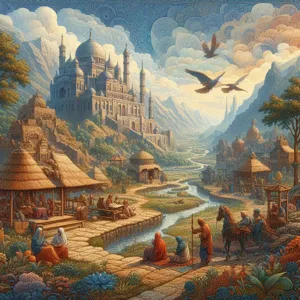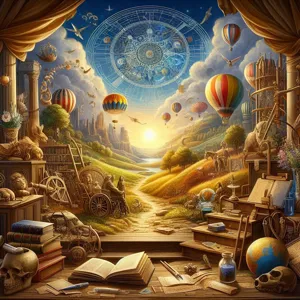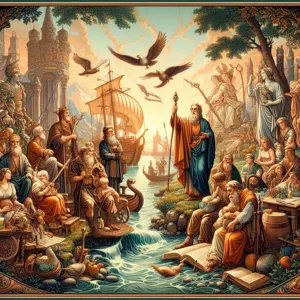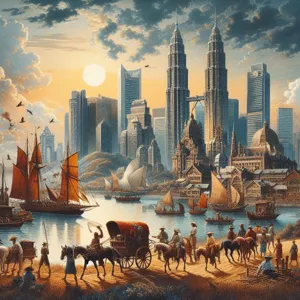As we stand at the crossroads of technological advancement and environmental consciousness, the quest for understanding what lies ahead has never been more captivating.
Books that envision our future offer a unique lens through which we can explore the possibilities and challenges of tomorrow, igniting our imaginations and expanding our perspectives. From dystopian tales that caution us about our present choices to optimistic narratives that inspire hope and innovation, these literary works provide not just entertainment but also profound insights into the human condition and our place in an ever-evolving world. In this guide, we will delve into the realm of speculative fiction, thought-provoking non-fiction, and transformative literature, helping you discover the best reads that not only reflect our current trajectory but also spark conversations about the future we want to create. Join us as we explore the pages that envision tomorrow, and find the perfect book to inspire your own journey into the unknown!
1. Introduction: The Importance of Futuristic Literature
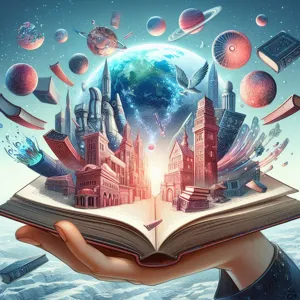
In an ever-evolving world, where technological advancements and societal shifts seem to unfold at breakneck speed, futuristic literature serves as both a mirror and a window. It reflects our current realities while simultaneously offering glimpses into possible tomorrows, urging us to ponder not just what is, but what could be. The importance of futuristic literature lies in its unique ability to challenge our perceptions, ignite our imaginations, and provoke critical conversations about the paths we are forging today.
From the cautionary tales of dystopian societies to the optimistic visions of utopian futures, these narratives invite readers to explore complex themes such as artificial intelligence, climate change, and the ethical implications of scientific innovation. They encourage us to consider the moral dilemmas and societal impacts of our choices, reminding us that the future is not predetermined but rather shaped by our collective actions and decisions.
Moreover, futuristic literature often serves as a rallying cry for change, inspiring readers to take an active role in crafting a better world. As we delve into these thought-provoking works, we find ourselves not just passive observers but engaged participants in the ongoing dialogue about our future. In this guide, we will explore how to navigate the vast landscape of futuristic literature, uncovering hidden gems and celebrated classics that challenge our imagination and inspire us to envision a brighter tomorrow.
2. Defining “Futuristic” in Literature
When we think of literature that embodies the notion of the future, the term “futuristic” can encompass a wide spectrum of interpretations. At its core, futuristic literature often explores speculative concepts that challenge our current understanding of society, technology, and human existence. It delves into the realms of science fiction, dystopian narratives, and utopian visions, each offering a unique lens through which we can examine the possibilities that lie ahead.
Futuristic literature frequently grapples with the impact of technological advancements on everyday life. authors like Isaac Asimov and Arthur C. Clarke have painted vivid pictures of advanced robotics and space exploration, inviting readers to ponder the ethical implications of artificial intelligence and interstellar travel. Meanwhile, contemporary voices such as N.K. Jemisin and Liu Cixin explore the intersection of cultural identity and global challenges, providing a thought-provoking commentary on climate change, resource scarcity, and societal evolution.
Dystopian tales, such as George Orwell’s “1984” or Margaret Atwood’s “The Handmaid’s Tale,” serve as cautionary tales that reflect our anxieties about surveillance, authoritarianism, and the erosion of personal freedoms. In contrast, utopian literature offers a glimpse into idealized futures, where harmony and technology coexist to create a better world. Works like Kim Stanley Robinson’s “Mars Trilogy” envision sustainable societies that challenge us to think critically about our present choices and their long-term consequences.
Ultimately, defining “futuristic” in literature invites us to engage with a diverse array of genres and themes, each offering a unique exploration of what tomorrow might hold. As we dive into these narratives, we are encouraged to reflect on our own values, aspirations, and the pathways we choose to shape the future. Whether you are drawn to the stark warnings of dystopia or the hopeful possibilities of utopia, understanding what makes literature futuristic allows you to uncover the rich tapestry of ideas that will inspire and provoke thought for generations to come.
3. Genres that Explore the Future: Science Fiction, Fantasy, and Beyond
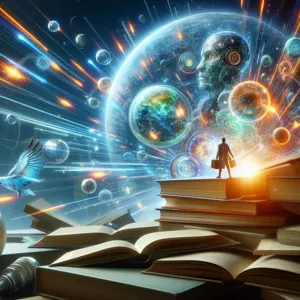
When it comes to envisioning our future, few genres capture the imagination quite like science fiction and fantasy. These literary realms not only transport readers to distant worlds and alternate realities but also serve as a mirror reflecting the possibilities—and pitfalls—of our own existence. Science fiction, in particular, delves into the intricacies of technology, space exploration, and societal evolution. Think of iconic works like Isaac Asimov’s “Foundation” series or Arthur C. Clarke’s “Rendezvous with Rama,” where authors extrapolate current scientific trends into plausible futures, inviting readers to ponder the implications of artificial intelligence, interstellar travel, and genetic engineering.
Fantasy, on the other hand, offers a different lens through which to explore the future. It transcends the limits of the known world, introducing magical elements and mythical creatures that challenge the status quo. Series like J.K. Rowling’s “Harry Potter” or Brandon Sanderson’s “Mistborn” evoke themes of heroism, conflict, and the struggle against oppressive forces, often reflecting contemporary societal issues through allegorical storytelling. Beyond these two giants, other genres like dystopian fiction and speculative fiction also play crucial roles in shaping our understanding of potential futures. Authors such as Margaret Atwood in “The Handmaid’s Tale” or George Orwell in “1984” craft cautionary tales that serve as stark warnings about the consequences of unchecked power and societal complacency.
Whether you lean towards the scientifically plausible or the fantastically imaginative, exploring these genres can provide invaluable insights into what tomorrow may hold. They challenge us to think critically about our choices today and inspire us to envision the kind of future we wish to create. So, as you embark on your literary journey, keep an eye out for these genres; they may just illuminate the path to understanding our collective destiny.
4. Key Themes in Future-Focused Books
When delving into the realm of future-focused literature, certain key themes frequently emerge, captivating readers and provoking thought about what lies ahead. These themes not only shape the narratives but also reflect our collective hopes, fears, and aspirations for the future.
One prevalent theme is **technological advancement and its implications**. Many authors explore the dual-edged nature of innovation—how it can lead to remarkable improvements in quality of life while also presenting ethical dilemmas and potential societal divides. Books like “The Circle” by Dave Eggers take readers through the seductive allure of a hyper-connected world where privacy becomes a relic of the past, prompting us to ask: at what cost do we pursue progress?
Another significant theme is **climate change and environmental sustainability**. As the planet grapples with the consequences of human activity, authors often envision futures where nature is both a friend and foe. Works such as “The Overstory” by Richard Powers weave intricate narratives that remind us of our connection to the earth and the urgent need for stewardship, inspiring readers to consider their role in protecting the environment.
**Social dynamics and human relationships** also play a crucial role in these narratives. From dystopian societies that explore the extremes of governance and control to utopian visions that celebrate community and cooperation, future-focused books often reflect our current social tensions and possibilities. “The Dispossessed” by Ursula K. Le Guin offers a poignant examination of anarchism and capitalism, challenging readers to rethink societal structures and the potential for human connection in an evolving world.
Lastly, the theme of **identity and self-exploration** is increasingly prominent as protagonists navigate their place in ever-changing realities. Whether through virtual realities or the redefinition of human experiences, these stories compel us to confront our own identities and the ways in which they might evolve. In “Neuromancer” by William Gibson, the lines between human and machine blur, prompting readers to reconsider what it means to be truly human in a technologically dominated future.
As you explore tomorrow through these compelling works, reflect on these themes and how they resonate with your own perceptions of the future. Each book offers a unique lens through which to envision what lies ahead, encouraging a deeper understanding of our world today and the paths we might take.
5. Notable Authors Shaping Tomorrow’s Narratives
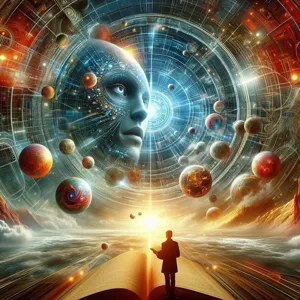
In the realm of speculative fiction and visionary storytelling, certain authors stand out as architects of tomorrow’s narratives. These writers possess a unique ability to weave together threads of imagination, science, and social commentary, crafting futures that both inspire and caution us. Their works not only entertain but also provoke thought about where humanity is headed.
One such author is **Margaret Atwood**, whose dystopian classics like “The Handmaid’s Tale” and “Oryx and Crake” delve into themes of environmental degradation, genetic engineering, and societal collapse. Atwood’s keen observations of contemporary issues make her foresight strikingly relevant, prompting readers to ponder the paths we might take as a society.
Another luminary is **William Gibson**, often lauded as the father of cyberpunk. His groundbreaking novel “Neuromancer” introduced readers to a world where technology permeates every facet of life, and his subsequent works continue to explore the implications of artificial intelligence, virtual reality, and corporate power. Gibson’s narratives challenge us to consider the ethical dilemmas that accompany technological advancements.
Then there’s **Kim Stanley Robinson**, known for his meticulously researched and optimistic portrayals of the future. With series like “Mars Trilogy,” he offers a vision of humanity’s potential to adapt and thrive on other planets, while also addressing pressing issues like climate change and social equity. Robinson’s hopeful yet realistic outlook serves as a beacon for those seeking solutions to today’s most daunting challenges.
**N.K. Jemisin**, with her award-winning “Broken Earth” trilogy, pushes the boundaries of speculative fiction by blending elements of fantasy with deeply rooted social commentary on race and power dynamics. Her narratives not only envision new worlds but also reflect on the realities of our own, encouraging readers to confront uncomfortable truths about society while imagining transformative futures.
These authors, among others, are not just crafting stories; they are shaping the narratives of our future. By engaging with their works, readers are invited to explore the myriad possibilities that lie ahead, empowering them to envision the world they want to inhabit and the steps needed to get there. Whether through cautionary tales or hopeful explorations, the literature of tomorrow is rich with insights that resonate long after the final page is turned.
6. Recommended Books: A Curated Reading List
As we embark on the journey of exploring our future through literature, it’s essential to immerse ourselves in stories that challenge our perceptions and ignite our imaginations. Below is a curated reading list of thought-provoking books that not only speculate about what lies ahead but also reflect our hopes, fears, and aspirations for tomorrow.
1. **“The Dispossessed” by Ursula K. Le Guin**
A cornerstone of speculative fiction, Le Guin’s novel offers a profound exploration of societal structures and personal freedom. Set in a dual-world system of capitalism and anarchism, it challenges readers to reconsider the very fabric of our existence and the choices we make.
2. **“Neuromancer” by William Gibson**
Often credited with launching the cyberpunk genre, Gibson’s groundbreaking work paints a dystopian future where technology intertwines with human consciousness. Its vivid portrayal of a digitized world serves as both a cautionary tale and an exhilarating adventure, forcing us to question the implications of our technological advancements.
3. **“The Overstory” by Richard Powers**
This Pulitzer Prize-winning novel weaves together the lives of multiple characters, all interconnected through their relationships with trees and nature. Powers invites readers to reflect on the environmental crises we face and the urgent need for a more harmonious existence with the planet.
4. **“The Ministry for the Future” by Kim Stanley Robinson**
In this ambitious narrative, Robinson tackles climate change and global politics with an optimism grounded in activism and innovation. The book presents a visionary roadmap for how humanity might confront its greatest challenges and work collaboratively toward a sustainable future.
5. **“Parable of the Sower” by Octavia Butler**
Butler’s dystopian tale follows a young woman with hyper-empathy living in a collapsing society. It’s a gripping exploration of resilience and community, highlighting the importance of empathy in an increasingly fractured world. Butler’s foresight into social issues resonates deeply in today’s context.
6. **“Station Eleven” by Emily St. John Mandel**
A beautiful meditation on art, memory, and human connection, Mandel’s post-apocalyptic novel unfolds in the aftermath of a devastating pandemic. Through the eyes of a traveling symphony, it emphasizes the enduring power of culture and storytelling in the face of adversity.
These selections not only entertain but also challenge us to think critically about the world we inhabit and the futures we are crafting. Each book serves as a mirror, reflecting both our current realities and the myriad possibilities that lie ahead. Dive into these pages, and let your imagination roam free as you envision the paths our civilization might take.
7. How to Choose Books That Resonate with Your Vision of the Future
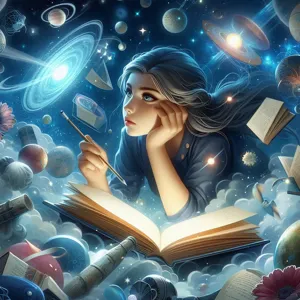
Choosing books that resonate with your vision of the future requires a thoughtful approach, as the literature in this genre can range from utopian dreams to dystopian nightmares. To begin, reflect on your own beliefs and values—what kind of future do you envision? Are you an idealist who dreams of a harmonious society built on cooperation and sustainability, or are you a realist who recognizes the challenges and struggles that may lie ahead? Identifying your perspective will help narrow down your choices.
Next, explore different sub-genres within speculative fiction. Science fiction often delves into technological advancements and their implications, while fantasy may offer alternative realities that challenge our notions of power and society. Look for authors who have a track record of addressing themes that align with your vision. Notable writers like Ursula K. Le Guin, Isaac Asimov, and Octavia Butler each present unique views that can provoke thought and inspire hope.
Don’t overlook the importance of diversity in your selections. Books by authors from various cultural backgrounds can provide fresh insights into the future, reflecting experiences and perspectives that differ from your own. This diversity enriches your understanding and broadens your imagination beyond conventional narratives.
Lastly, read reviews and participate in discussions with fellow readers. Online forums, book clubs, and social media platforms can guide you toward titles that resonate with like-minded individuals. Engaging with a community can reveal hidden gems that might not be on your radar. By combining introspection with exploration, you’ll be well-equipped to select books that not only align with your vision of the future but also challenge and expand your understanding of what’s possible.
8. The Role of Dystopian vs. Utopian Perspectives
The exploration of our future through literature often oscillates between dystopian and utopian perspectives, each offering unique insights into the human condition and societal potential. Dystopian novels paint a grim picture, frequently serving as cautionary tales that hold a mirror to contemporary issues such as political oppression, environmental degradation, and social inequality. Works like George Orwell’s *1984* or Margaret Atwood’s *The Handmaid’s Tale* expose the vulnerabilities of our current systems and challenge us to reflect on the consequences of unchecked power and moral apathy. These narratives compel readers to confront uncomfortable truths and consider the fragility of our freedoms, pushing the boundaries of what could happen if we stray too far from ethical governance and community solidarity.
On the other hand, utopian literature invites readers to envision a more harmonious future, showcasing societies where human potential is fully realized, and conflicts are resolved through understanding and cooperation. Books such as Aldous Huxley’s *Island* or Ernest Callenbach’s *Ecotopia* present optimistic frameworks that encourage innovation, empathy, and sustainable living. These narratives inspire readers to dream of what could be possible when we prioritize communal well-being, environmental stewardship, and equitable access to resources. Utopian stories serve as blueprints for change, igniting hope and motivating individuals to take action in the real world.
Both perspectives play a crucial role in shaping our understanding of the future. While dystopian tales warn us of the paths we must avoid, utopian visions empower us to aspire toward a better world. As you delve into the realm of speculative fiction, consider the balance between these two viewpoints. Engage with the warnings of dystopia, but also allow yourself to be uplifted by the possibilities of a utopian existence. By exploring literature that encompasses both ends of the spectrum, readers can cultivate a more nuanced understanding of the future—one that acknowledges our challenges while simultaneously fueling our hopes for a brighter tomorrow.
9. Exploring Non-Fiction: Futurism and Predictions
When it comes to envisioning our future, non-fiction books provide a treasure trove of insights and predictions that can shape our understanding of what lies ahead. In this genre, futurism takes center stage, offering readers a lens through which they can explore the possibilities of tomorrow. From technological advancements and societal shifts to environmental challenges and economic transformations, non-fiction works delve deep into the trends and theories that speculate on the path humanity may take.
One of the most exciting aspects of reading futurist literature is its blend of rigorous research and imaginative foresight. Authors often collaborate with experts in various fields—scientists, economists, sociologists, and technologists—to present well-rounded perspectives on potential future scenarios. For instance, books like “The Future Is Faster Than You Think” by Peter Diamandis and Steven Kotler examine the accelerating pace of innovation and its implications for industries ranging from healthcare to transportation. By analyzing current trends, they offer compelling predictions about how emerging technologies could reshape our daily lives.
Moreover, non-fiction futurism is not solely about technological advancements; it also addresses the ethical and philosophical dilemmas that may arise as we venture into uncharted territories. Titles such as “Homo Deus: A Brief History of Tomorrow” by Yuval Noah Harari challenge readers to contemplate the moral implications of artificial intelligence, genetic engineering, and the quest for immortality. These discussions prompt us to reflect on what it means to be human in an ever-evolving world.
As you explore this fascinating genre, consider diversifying your reading list to include various perspectives. Look for books that encompass not only predictions but also actionable insights on how we can navigate the complexities of the future. Engaging with non-fiction futurism equips you with the knowledge to think critically about potential outcomes and empowers you to be an active participant in shaping the world to come. So, grab a book, open your mind, and embark on a journey through the possibilities that await us in the uncharted expanse of tomorrow.
10. The Impact of Technology on Future Literature
As we venture deeper into the 21st century, the interplay between technology and literature continues to evolve, shaping not only how stories are told but also the very themes that dominate the literary landscape. The impact of technology on future literature is profound, as it opens new avenues for creativity and redefines the relationship between authors and their audiences.
Writers are increasingly incorporating advancements like artificial intelligence, virtual reality, and augmented reality into their narratives, creating immersive experiences that engage readers in unprecedented ways. Imagine reading a novel where the characters react to your choices, or exploring a dystopian world through a virtual environment that brings the text to life. These innovative formats challenge traditional storytelling and invite readers to participate actively in the unfolding of the narrative.
Moreover, technology is changing the way literature is distributed and consumed. E-books and audiobooks have made literature more accessible than ever, allowing readers to carry entire libraries in their pockets or experience stories through their ears while multitasking. Social media platforms and online book clubs provide spaces for discussion, fostering communities that connect readers across the globe. As authors tap into these platforms, they can share their visions for the future, receive immediate feedback, and even crowdsource ideas, making the creative process more dynamic and collaborative.
However, this technological revolution also raises questions about the essence of literature itself. Will the tactile experience of holding a book in hand become obsolete? How will the rise of algorithms and data-driven content influence the types of stories that get told? As we explore these questions, we find ourselves at the intersection of innovation and tradition, where the future of literature is not just about the stories we tell but also about how and why we tell them.
In this brave new world of storytelling, the possibilities are limitless. Whether through the lens of speculative fiction, where technology takes center stage, or through narratives that critique our reliance on it, the impact of technology on future literature invites us to reflect on our own relationship with the world around us. As we navigate these changes, we are not only witnesses to the evolution of literature but also active participants in shaping the stories that will define tomorrow.
11. Community Engagement: Book Clubs and Discussions
Engaging with others through book clubs and discussions can significantly enrich your reading experience, especially when exploring themes that envision our future. These communities provide a platform for readers to come together, share insights, and delve deeper into the ideas presented in the books. Joining or forming a book club focused on speculative fiction, futurism, or other genres that grapple with the possibilities of tomorrow can foster meaningful conversations that challenge your perspectives and spark innovative thinking.
Imagine gathering in a cozy living room or a vibrant café, surrounded by fellow enthusiasts who share your passion for the future. As you discuss the latest dystopian novel or a thought-provoking non-fiction piece on emerging technologies, you’ll find that the diverse backgrounds and viewpoints of your group can illuminate aspects of the text you may have overlooked. The exchange of thoughts not only deepens your understanding but also enhances your appreciation for the author’s vision.
Many local libraries and bookstores host regular discussions and reading groups that focus on future-oriented literature. These events often feature guest speakers, such as authors or experts in relevant fields, who can provide additional context and expertise, bringing the themes of the books to life. Online forums and social media groups also offer a space for those unable to meet in person, allowing you to connect with a global audience eager to engage in dialogue about the future.
Incorporating community engagement into your reading journey not only keeps you motivated and accountable but also helps you stay informed about new releases and hidden gems that explore our potential futures. As you share your thoughts and hear those of others, you’ll find that the act of reading transforms from a solitary pastime into a collaborative exploration, making the process of envisioning tomorrow all the more exciting and impactful.
12. Finding Indie and Lesser-Known Authors
In a literary landscape often dominated by mainstream publishers and bestselling authors, exploring the works of indie and lesser-known authors can lead to some of the most imaginative and thought-provoking visions of our future. These writers often bring fresh perspectives and innovative ideas, unencumbered by the constraints of commercial pressures. They dare to venture into uncharted territories, weaving narratives that challenge conventional thinking and inspire new possibilities.
To begin your journey into the world of indie authors, consider diving into online platforms such as Goodreads, where you can find curated lists and recommendations specifically highlighting independent authors. Websites like Book Riot and The Indie Bookstore Finder also serve as valuable resources, connecting readers with indie bookstores that champion lesser-known voices.
Social media platforms, especially Twitter and Instagram, have become vibrant communities for indie authors to showcase their work. Following hashtags like #IndieAuthor and #BookCommunity can lead you to hidden gems that might just resonate with your vision of the future. Don’t hesitate to engage with these writers—many are eager to connect with readers, share insights, and discuss their inspirations.
Another rewarding approach is to explore self-publishing platforms such as Kindle Direct Publishing or Smashwords. Here, you can discover a wide array of titles that might not be available through traditional channels. Often, these books are priced affordably, allowing you to explore multiple options without breaking the bank.
Additionally, consider seeking out local literary events, such as author readings, book fairs, or writing workshops, where indie authors often showcase their talents. These gatherings not only provide the opportunity to discover new books but also allow you to support your local literary scene and connect with the authors behind the stories.
By venturing beyond the mainstream, you may unearth narratives that resonate profoundly, offering unique insights into the challenges and triumphs that await us in the future. Embracing the voices of indie and lesser-known authors enriches your reading experience, providing a more diverse and imaginative outlook on the world to come.
13. How to Stay Updated on Emerging Titles
Staying updated on emerging titles in the realm of future-focused literature requires a keen eye and a proactive approach. With the ever-growing landscape of publishing, new voices and innovative ideas are constantly emerging, making it essential for avid readers to keep their finger on the pulse of what’s next.
Start by following dedicated literary websites and blogs that specialize in speculative fiction, science fiction, and futurism. Websites like Tor.com, Strange Horizons, and Locus Magazine often feature reviews, author interviews, and curated lists of upcoming releases that can provide invaluable insights into what’s trending. Subscribing to newsletters from these platforms can ensure that you’re always in the loop on the latest announcements and critical discussions.
Social media is another powerful tool for staying informed. Platforms like Twitter and Instagram can connect you directly with authors, publishers, and fellow book enthusiasts. Follow hashtags such as #NewBooks, #SciFi, and #Futurism to discover fresh titles and engage in conversations about the themes and ideas they explore. Many authors announce their new releases and related events on these platforms, making it a great way to discover hidden gems.
Don’t overlook the power of your local library or independent bookstore! Many libraries offer programs that highlight new arrivals, and staff recommendations can often lead you to exciting new authors and titles. Indie bookstores frequently host events with authors and provide lists of upcoming releases, making them a valuable resource for those looking to explore the future of literature.
Finally, consider joining online book clubs or forums dedicated to speculative fiction. Platforms like Goodreads not only allow you to track what you’ve read but also to follow lists and discussions focused on upcoming releases. Engaging with a community of like-minded readers can introduce you to titles you might not have discovered otherwise.
By actively seeking out information and engaging with the literary community, you can stay updated on emerging titles that envision our future, ensuring that your reading list is as forward-thinking as the ideas contained within the pages.
14. Conclusion: The Power of Imagination in Shaping Our Future
As we conclude our exploration of books that envision our future, it’s essential to reflect on the profound power of imagination in shaping the world that lies ahead. Literature has always served as a mirror to society, reflecting our hopes, fears, and aspirations. The stories we read today are not mere fantasies; they are blueprints that can inspire real change and innovation.
In a time when technological advances and environmental challenges loom large, these narratives encourage us to think critically about the choices we make today and their implications for tomorrow. Whether it’s through speculative fiction that challenges our understanding of ethics in technology or dystopian tales that caution us against societal complacency, the themes woven into these stories serve as a reminder that the future is not predetermined. Rather, it is a tapestry we are actively weaving, thread by thread.
By engaging with these visionary works, we not only expand our horizons but also ignite our creative potential. Imagine a world where renewable energy thrives, where communities come together to address climate change, or where artificial intelligence enhances human experience without compromising our values. These possibilities begin in the minds of writers and thinkers who dare to dream—and in our own minds, as we digest their visions and let them inspire our actions.
As you embark on your reading journey, remember that each book is an invitation to imagine, to question, and to envision new pathways for humanity. So, let the power of imagination be your guide as you explore the narratives that shape our future. The stories that resonate with you today could very well influence the decisions we make tomorrow, driving us toward a more hopeful and sustainable world. Embrace the adventure of reading, and together, let’s imagine a brighter future.
15. Call to Action: Share Your Favorite Futuristic Reads!
As we wrap up this exploration into the realm of futuristic literature, we want to hear from you! Books have the incredible power to ignite our imaginations, challenge our perceptions, and inspire us to think beyond the boundaries of our current reality. Now, it’s your turn to contribute to this vibrant conversation.
What are the titles that have captivated your imagination and offered a glimpse into possible futures? Whether it’s the thought-provoking social commentary found in classic science fiction or the groundbreaking narratives that tackle emerging technologies and their implications, we want to know which books have resonated with you the most.
Perhaps you’ve stumbled upon an indie gem that paints a unique vision of tomorrow, or maybe a bestselling novel that left you pondering the future long after you turned the last page. Whatever your favorites may be, sharing them can help others discover new worlds and ideas that push the envelope of what’s possible.
Join the discussion in the comments below! List your must-read futuristic books, and let’s create a collective bookshelf that inspires curiosity and exploration. Your recommendations could be the key to unlocking someone else’s imagination, leading them to their next favorite read. Together, let’s celebrate the power of literature to envision and shape the future!
In conclusion, we hope this guide has inspired you to embark on your own literary journey into the realms of tomorrow. The books that envision our future offer not only a glimpse into what could be but also challenge us to reflect on our present choices and their implications. By exploring the diverse narratives crafted by visionary authors, you can engage with new ideas, foster critical thinking, and perhaps even ignite your passion for change. As you delve into these thought-provoking works, remember that the future is not just something we await—it is something we actively shape. Happy reading, and may your explorations lead you to exciting new horizons that inspire hope and innovation!

